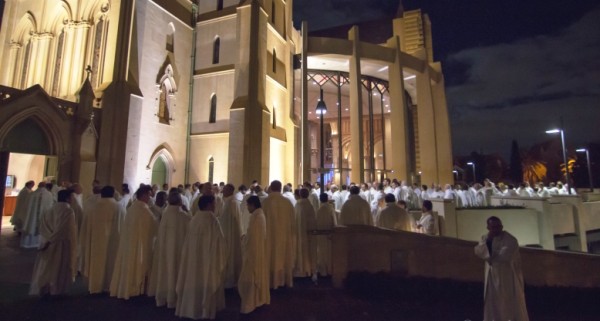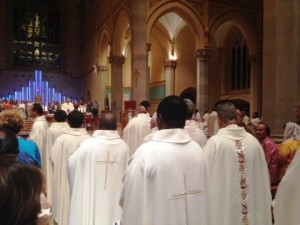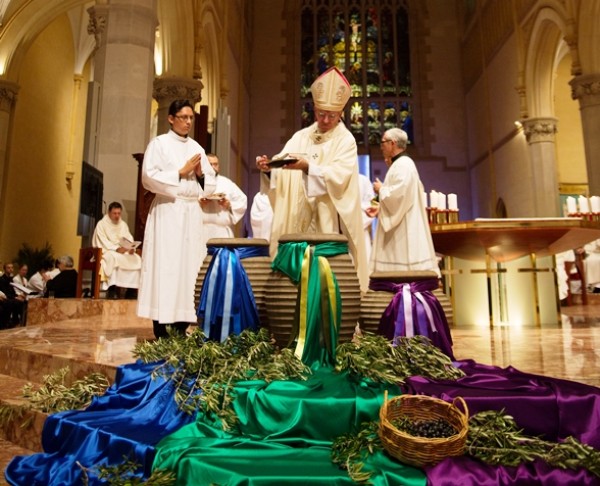Perth celebrates the Chrism Mass
“Jesus never fails his failing disciples” Chrism Mass Homily
by Most Rev Timothy Costelloe, Archbishop of Perth - St Mary’s Cathedral
15 April 2014
Catholics from across the Archdiocese of Perth gathered together to witness over 180 diocesan and religious priests renew their commitment to priestly service in which they promised to “be more united with the Lord Jesus and more closely conformed to him” as “faithful stewards of the mysteries of God” and to also “discharge faithfully the sacred office of teaching… not seeking any gain, but moved only by zeal for souls”.

In him homily, Archbishop Costelloe spoke of his final years of formation prior to ordination as a priest in which his lecturer “made a compelling case… not just because it seemed to make sense of some of the strange elements in Mark’s Gospel, but more importantly because it gave expression to a very powerful truth about Jesus as he is presented in the whole gospel tradition and in the ongoing faith of the Church.
“It is an approach” said the Archbishop, “which has a particular relevance for us as priests, and indeed for the whole archdiocese, as we grapple with the many urgent and difficult issues which confront us.” He went on to say that “the heart of the gospel message, this lecturer and scripture scholar explained, can be expressed in this short phrase: Jesus never fails his failing disciples.”
The Archbishop stated that “every one of us here in the Cathedral this evening experiences failure in his or her life. Sometimes this failure is the result of our own sin, sometimes it is the consequence of the sins of others, and sometimes it is just part of living in an imperfect world. Because this is true of everyone here tonight, it is also true of those among us who have been called to the ministerial priesthood as priests or bishops.

“It is vitally important that each one of us acknowledges this in our own life, and recognizes that it is true for each of our brothers in the priesthood as well. In saying this I am obviously not extending an invitation to us to point the finger at the failings of our brothers. Rather I am inviting us to look on our brothers with compassion and on ourselves with humility. The Lord, on the day of our ordination, commissioned and empowered us to do great things – and sometimes, perhaps even often, we do. But each of us knows how often and how badly we fail. It is in the light of this that we can remember the Jesus of Mark’s gospel – the Jesus who never fails his ever-failing disciples.”
The Archbishop then spoke of Jesus being presented in the gospels as a healer – of the blind, the lame, the paralyzed, the deaf, even raising the dead to life. “One of the main features of [the healing miracles in the synoptic gospels]” he said, “is that those who are suffering come to Jesus deeply aware of their desperate plight and conscious that they are unable themselves to do anything to relieve their situation. Think of the paralyzed man whose friends lower him down from the roof, or the woman with the uncontrollable hemorrhage. Jesus insists that it is their faith that has saved them, but it is only their recognition of their helplessness, and of the reality of their situation, which leads them to Jesus in the first place.”
He went on to say that “It is our deep awareness of our need, and our readiness to admit, in all humility, that we cannot ourselves bring healing or wholeness, that will open us to the power of Christ in our lives. If every Christian person needs to learn this lesson how much more do we, who are called to be living signs of Christ’s presence among his people as their Good Shepherd, need to honestly acknowledge our failings, our weakness and our brokenness, and bring them to Christ, crying out to him as Bartimaeus did, “Jesus, Son of David, have pity on me”. He will say to us as he did to Bartimaeus, “What do you want me to do for you?” It is only searing honesty and deep humility which will enable us to give him an answer. But in the giving of that answer, the healing power of the Lord will be unleashed within us, perhaps in ways we can’t imagine.”
“As priests and bishops we are called to do as Jesus did, to serve rather than to be served. We are called to the role and burden of leadership in the Christian community, but that leadership will only ever be properly exercised if we do so from a position of humility, of self-effacement, of total self-giving. It is only when we are healed of the opposite, of pride and self-promotion and self-centredness, that we will be the disciples we are called to be.
The Archbishop concluded saying: “The priests of our archdiocese, all of you gathered here tonight and those who cannot be here, are an extraordinary group of men. We have given our lives to the Lord, and to his people. We are men of the Church doing our best to be Good Shepherds to God’s people. We try to be instruments of the Lord’s presence and his love. But we are also fragile, weak and sinful. Tonight, as we thank God for this extraordinary gift and privilege he has given us, and as we recommit ourselves to our vocation, let us not be afraid or ashamed to admit our failings, and acknowledge our sins. Jesus never fails his failing disciples. He forgives them, he strengthens them, he enlightens them and every time they fall he picks them up, puts them back on their feet and says to them, “feed my lambs, feed my sheep”.”
The blessing of the oils of the sick, of the catechumens and of Chrism then took place, filling the cathedral with a mixture of sweet fragrances.

